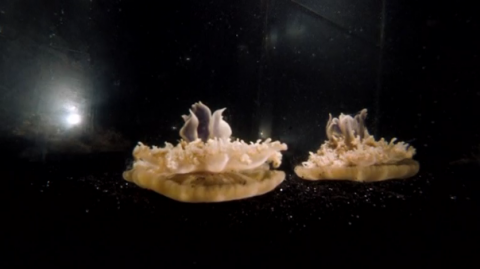
CALIFORNIA, United States (Reuters) — A brainless, spineless, pulsating organism has a key behavior in common with humans: sleep.
While sleep has been confirmed in other invertebrates such as worms and fruit flies, the jellyfish is the most evolutionarily ancient animal that has been shown to slumber.
Jellyfish have thrived in the seas for at least 600 million years, longer than nearly any other animal. By comparison, dinosaurs appeared roughly 230 million years ago and humans appeared roughly 300,000 years ago. The findings involving such a primordial creature raise fresh questions about sleep’s origin and purpose.
Jellyfish are among the first animals to have developed neurons – nerve cells – although they lack a brain, spine or central nervous system.
Cassiopea jellyfish live in clear, shallow, tropical waters of the Pacific and western Atlantic oceans, eating plankton. Measuring about 1-2 inches (2.5-5 cm) in diameter, they are dubbed the “upside-down jellyfish” because they lie on the seafloor inverted in the water with their tentacles upward.
The researchers at the California Institute of Technology (Caltech) defined sleep by three criteria: a period of reduced activity known as quiescence, slower reponse time to stimuli and an increased sleep drive when deprived of sleep. They then placed cassiopea jellyfish, known as an upside jellyfish, in a 35 litre tank and monitored them continuously for six days and nights.
They used cameras to monitor how often the jellyfish pulsed. At night, they found they only pulsed around 39 times each minute, compared to around 58 times each minute during the day.
To test the cassiopeas’ response time during their period of decreased activity the Caltech team lifted the jellyfish on a screen higher in the tank and then pulled the screen away. This kind of jellyfish prefer to rest on a surface and in the day time would drop to the bottom of the tank straight away. At night, they floated in the water for up to five seconds before doing this, showing their response time was slower.
The team then deprived the test jellyfish of sleep by pulsing water towards them every 10 seconds for 20 minutes at night, effectively ‘poking’ them awake. During the day, the researchers found that the jellyfish were more likely to fall into the quiescent state during the day, when they would normally be active.
The Caltech researchers say their study shows jellyfish share the genetically encoded behavioural state of sleep with mammals and birds. They say periods of quiescence might be found in other organisms like plants, bacteria and fungi.







